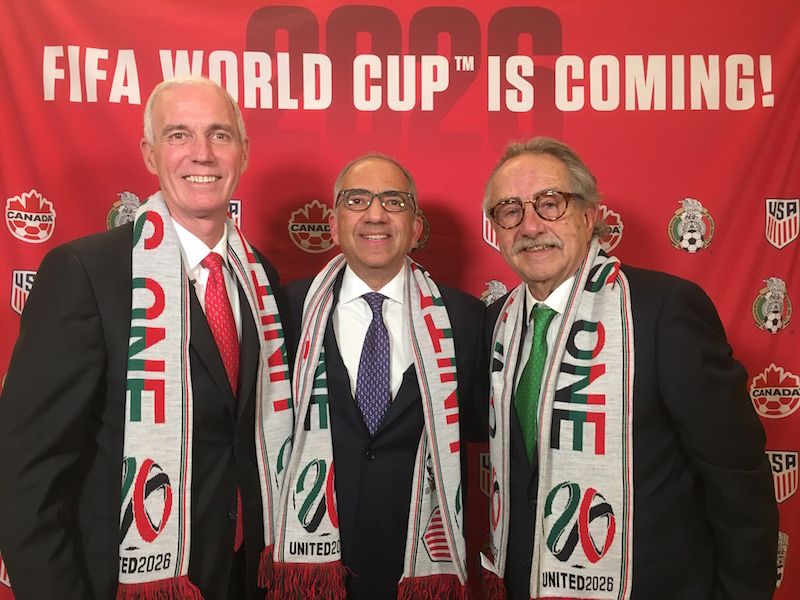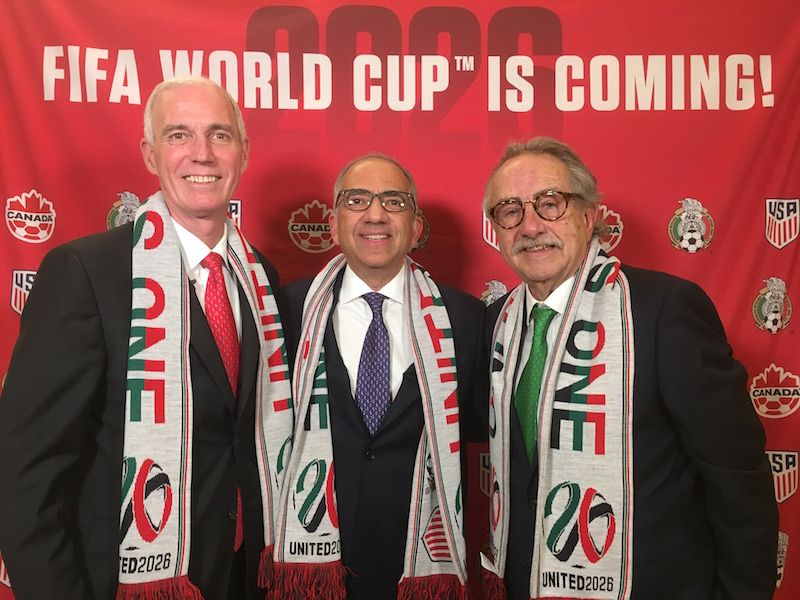Participants
Carlos Cordeiro – President, U.S. Soccer
Decio de Maria – President, Federación Mexicana de Fútbol Asociación
Steven Reed – President, Canada Soccer
Could you tell us what winning this bid will mean for soccer in the United States?
Carlos Cordeiro: “Firstly, let me say this is a great day for soccer, for football and a great day for North America. We have to appreciate that for the first time in 32 years, we will have the privilege, the pleasure, the honor to host a FIFA World Cup for men. It goes without saying that we are very humbled about that.
“When we got together some years ago, we all recognized that we are stronger as a team. No one country here, even including my own, could have done it by themselves. I think we presented a much more compelling opportunity to FIFA and the FIFA Member Associations by coming together as three nations. That is really the story here – the fact that we decided to come together. We put together an amazing bid with 23 fantastic cities across three countries, obviously supported by wonderful infrastructure and hundreds of years of a common culture, sharing each other’s languages and food. We see this as a great celebration of football that will be something we’re looking forward to.”
What role do you think Miami and other cities could play in the 2026 FIFA World Cup?
CC: “Obviously Miami is very special to me, being my hometown. In fact, the beaches feature prominently in some of our bid slides. We are blessed with 23 really world-class stadiums – some iconic, some brand new, cutting edge and everything in between. When we have to determine the final 16 cities, it will be a very difficult decision that all three of us will have to make along with the folks at FIFA. It speaks to the quality of the facilities we have that this is not a decision I’m looking forward to – it’s going to be very hard.
“We’re very excited, there’s no question about the quality. If you look at the grades we received from the FIFA Taskforce, we got outstanding marks when it came to our infrastructure, our stadiums and facilities. That’s in Miami, but it’s also everywhere else and for that we’re very grateful and we’re obviously very pleased.”
Steven Reed: “As Carlos said, we’re really excited about the prospect of entertaining the World Cup in 2026 in our country of Canada. We have three wonderful host cities that have had great success in the past with hosting international sporting events, including the Women’s World Cup, Women’s U-20 World Cup and Men’s U-20 World Cup. I think all of those host cities are really excited to be part of this process. Along with Carlos’ comments, there are going to be some disappointments, unfortunately, but hopefully we can have the most successful World Cup of all time and engage all the people from all three of our countries.”
Decio de Maria: “I think Miami being part of this project is a recognition of the investors that we’ve had for a long time and now are more openly investing in developing football in Miami. They should be very excited about that and receive applause, because they are now going to further develop football in the area of Miami.”
How much energy and effort was expended in trying to mitigate any political effects on the bid?
CC: “We’re very, very grateful for the strong support of the bid from all three national governments. If you stop and appreciate for a second just the vast number of assurances and guarantees that we had to get from all three governments working together, that is a massive undertaking for one nation, let alone three nations, so if there was any complexity here, it was the fact that the three nations working together just raised the difficulty of getting this stuff done. FIFA would not have given us the scores we got – which were the highest scores – were it not for the fact that we got exactly what we needed from all of our governments. It doesn’t speak to mine as it does to all three.
“As far as the U.S. is concerned, you probably are aware that just overnight we got a Senate resolution supporting the bid unanimously passed, we got the same some weeks ago from the U.S. Congress and so it was truly bipartisan. It so happens that our President today is a Republican, but at the end of the day, this was a bipartisan effort. The folks at the White House were very focused on assisting us and getting the right paperwork and with that, our scores were where they were and I think that speaks to the compelling bid we had to offer.”
Now that you’ve landed the 2026 FIFA World Cup, what do you see as the biggest commercial opportunity in your respective countries in this eight-year buildup until the event starts?
SR: “It’s a tremendous opportunity for us. This is clearly a world-class event, the scope of which we haven’t seen in our country, and we’ve hosted the Winter Olympics in Vancouver-Whistler and many, many years ago we had the Calgary Winter Olympics. But this is enormous and I think clearly there is a great opportunity to commercialize this, create new and lasting sponsorship opportunities and ultimately, our focus is to grow our sport, grow our game and to provide the impetus for that.
“We’ve got the strength in numbers, where we have over a million registered players in a country that only has over 30 million in total population. It’s one of the strongest sports, one of the largest sports and I think that we can become the preeminent sport in our country. That’s the legacy that we would love to see.”
Listening to Mr. Infantino a couple minutes ago in the press conference, he said that it was Concacaf's decision regarding qualifying for 2026 and that it was Concacaf's decision to award the three spots directly to the United States, Mexico and Canada. Did you emphasize with Concacaf, prior to the bid, how important this was for you? Was this a priority for everybody in the bid to include Canada, Mexico, and the United States directly into the World Cup?
CC: “I think you’re asking lots of different questions there. The issue about who would get automatic bids to the 2026 FIFA World Cup, if that’s the question, that is not Concacaf’s decision, that’s FIFA’s decision, and that will be made in the passage of time.
“If the question was more about why did the three of us come together, that was not Concacaf’s decision, that was our decision. Three nations deciding that we wanted to work together. We felt we’d be stronger as a partnership of three in presenting ourselves to FIFA and the member associations. Obviously, we’re all proud members of Concacaf, we’re all contributors to Concacaf, but ultimately, these were decisions that we made ourselves as independent football associations.”
Carlos, you’re sitting in the hall, the time comes up for the vote. What’s going through your mind? Did you think it would be that much of a landslide?
CC: “We always had a very clear pathway to victory, we’ve had that for some time. And that basically triggered a strategy: how do we get there? We’ve been saying for some time now that step number one was to basically consolidate our support at home, meaning the Western Hemisphere. Today we got 100 percent of Concacaf, which is an incredible achievement considering the diversity, the makeup of Concacaf. And we got 90 percent of CONMEBOL, nine out of ten, isn’t that a great achievement? We started there and we were very successful in anchoring our support with that early momentum coming out of the Western Hemisphere.”
“We then had a very clear focus on Asia. I don’t have the exact numbers, but I think we got something like 35 votes out of Asia, which is awesome considering there are only 46. And we’re not an Asian country, we don’t normally interact with Asia, apart from our senior women who play now and then.
“So, the Asia strategy was very successful, and then we came back and finished up the exercise in Europe and again, we were very pleased with the support we got there. I would say about 10 days ago, we had a sense that this was breaking our way. To say that we knew it was going to be a landslide is probably unfair, but we knew it was going to go well for us, so we were very, very pleased at the end with the result and delighted that it was the result it was.”
Carlos, I read a quote of yours basically talking about using the 2026 World Cup as an incentive to get more people in this country involved in the game. You were quoted as saying our disenfranchised, our underserved, if we can bring them into the game, we’ll go from four million to 12 million participants and every little kid will say ‘I want to play in the World Cup’, and why can’t they?
Is the 12 million an actual number you’re shooting for or just something you threw out and can you share specific plans as far as how you would reach the disenfranchised?
CC:
“What I can tell you is that we believe that soccer or football will become the preeminent sport in North America. And I’m not just speaking for the U.S., I think I speak for Canada. Steven Reed talks a lot about how many more kids are playing football today than are playing ice hockey. Fact. The reality is in the United States, on the men’s side, we have a lot of competition, with three or four other sports, we’re not quite at the top yet. We believe this event will become a lightning rod, will become transformational for the sport as kids who are now eight, 10, 12 years old can all dream of potentially playing for a national team. There is some of that built into that; I think that’s what you’re getting at. By and large, we need more kids, boys and girls in the United States, playing soccer, inside the umbrella of the Federation. We don’t have enough of them. At three and a half or four million registered kids we believe there are many, many more out there who could be playing with us."

